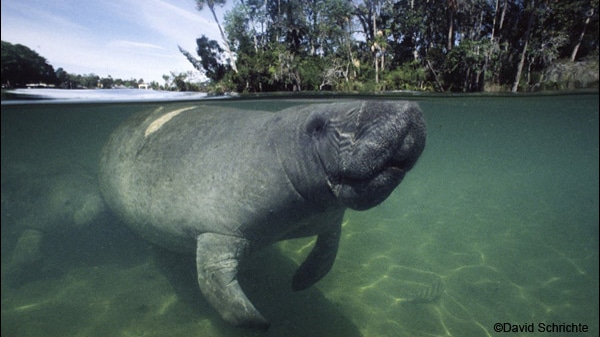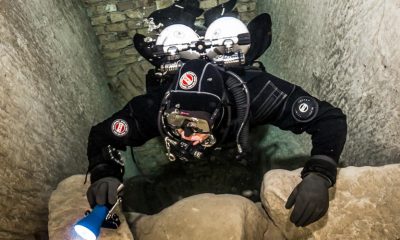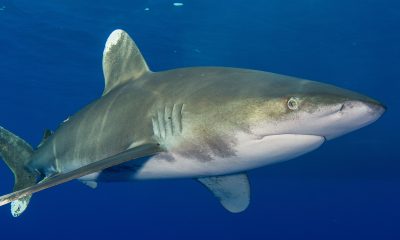Marine Life & Conservation
Summer Boating Safety for Manatees and Boaters Alike

![]() Save the Manatee Club is proud to be a partner of National Safe Boating Week, the official launch of the 2021 Safe Boating Campaign. This yearlong campaign promotes recreational boating safety, such as wearing life jackets and not boating while under the influence of alcohol. Save the Manatee Club also uses the campaign to remind boaters of manatee-safe boating tips.
Save the Manatee Club is proud to be a partner of National Safe Boating Week, the official launch of the 2021 Safe Boating Campaign. This yearlong campaign promotes recreational boating safety, such as wearing life jackets and not boating while under the influence of alcohol. Save the Manatee Club also uses the campaign to remind boaters of manatee-safe boating tips.
During the summer, manatees are found in shallow estuaries, bays, rivers, canals, and coastal areas throughout Florida and in neighboring states – most commonly Georgia, South Carolina, and Alabama. Because imperiled manatees are generally slow-moving and must surface to breathe air, they are especially vulnerable to collisions with fast-moving watercraft. Boat accidents are the primary cause of human-related manatee deaths. According to the Florida Fish and Wildlife Conservation Commission (FWC), most manatee deaths from watercraft collisions are caused by blunt-force impact, meaning that the speed at which boaters are traveling are causing strikes with deadly force. Those manatees that survive bear scars from their injuries. In fact, most living manatees have some sort of scar from a boat collision.
These tragic accidents are preventable with education, awareness, and the care of the boating community. Posted slow speed “manatee zones” indicate the likely presence of manatees and should be navigated through carefully. Boater’s guides usually list the location of manatee zones and can be reviewed before each boat trip. In addition to obeying posted speed zones, those on board should keep a lookout for manatees in the water by wearing polarized sunglasses to see below the water’s surface, and scanning for manatees’ snouts, backs, tails, flippers, or “footprints” – the flat, circular spot on the water created by the manatee’s moving tail. Following these tips, along with the Safe Boating Campaign’s guidelines, can help keep both boaters and manatees safe.
Boaters, paddlers, or those who spend time near the water are also encouraged to be a voice for manatees by immediately reporting injured, malnourished, orphaned, entangled, stranded, or dead manatees to the FWC or their local state wildlife officials. Manatees that have fresh pink or red wounds, are breathing more often than every 30 seconds, or are unable to submerge or tilting to one side, may be injured and should be reported. Boaters should not attempt to remove entanglements, such as monofilament fishing line, crab trap lines, or other marine debris, from manatees themselves – instead, they should report them so a trained biologist can assess the situation. In Florida, boaters can contact VHF Channel 16 on their marine radio or call the FWC at 1-888-404-FWCC (3922). Learn more tips on spotting and reporting sick or injured manatees at savethemanatee.org/rescue.
Save the Manatee Club offers a number of free materials available upon request to help safeguard manatees and increase awareness of manatee-safe boating tips. Shoreline property owners as well as park and marina managers can order aluminum signs alerting others to the presence of manatees in the area. And boaters and paddlers can request packets that include a safety tips card, a waterproof boat banner, and a decal to adhere to your vessel with the number to report manatees in distress. Order free materials at savethemanatee.org/resources.
Join Save the Manatee Club on Facebook, Instagram, and Twitter to learn more and get involved.
Marine Life & Conservation
Double Bubble for Basking Sharks

 The Shark Trust is excited to announce that, for two more days only, all donations, large or small, will be doubled in the Big Give Green Match Fund!
The Shark Trust is excited to announce that, for two more days only, all donations, large or small, will be doubled in the Big Give Green Match Fund!
Donate to Basking in Nature: Sighting Giants
The Shark Trust is hoping to raise £10k which will be doubled to £20k. This will go towards Basking in Nature: Sighting Giants. And they need YOUR help to reach they’re goal.
The Shark Trust’s citizen science project is to monitor and assess basking sharks through sightings; encouraging data collection, community engagement, and promoting nature accessibility. This initiative aims to enhance health and wellbeing by fostering a deeper connection with British Sharks.
Campaign Aims
- Increase citizen science reporting of Basking Sharks and other shark sightings to help inform shark and ray conservation.
- Provide educational talks about the diverse range of sharks and rays in British waters and accessible identification guides!
- Create engaging and fun information panels on how to ID the amazing sharks and rays we have on our doorstep! These can be used on coastal paths around the Southwest. With activities and information on how you can make a difference for sharks and rays!
- Promote mental wellbeing through increasing time in nature and discovering the wonders beneath the waves!
Donate, and double your impact. Click Here
Marine Life & Conservation
Leading UK-based shark conservation charity, the Shark Trust, is delighted to announce tour operator Diverse Travel as a Corporate Patron

 Corporate Patrons provide a valuable boost to the work of The Shark Trust. The Trust team works globally to safeguard the future of sharks, and their close cousins, the skates and rays, engaging with a global network of scientists, policymakers, conservation professionals, businesses and supporters to further shark conservation.
Corporate Patrons provide a valuable boost to the work of The Shark Trust. The Trust team works globally to safeguard the future of sharks, and their close cousins, the skates and rays, engaging with a global network of scientists, policymakers, conservation professionals, businesses and supporters to further shark conservation.
Specialist tour operator Diverse Travel has operated since 2014 and is committed to offering its guests high quality, sustainable scuba diving holidays worldwide. Working together with the Shark Trust will enable both organisations to widen engagement and encourage divers and snorkellers to actively get involved in shark conservation.
“Sharks are truly at the heart of every diver and at Diverse Travel, we absolutely share that passion. There is nothing like seeing a shark in the wild – it’s a moment that stays with you forever!” says Holly Bredin, Sales & Marketing Manager, Diverse Travel.
“We’re delighted to celebrate our 10th year of business by becoming a Corporate Patron of the Shark Trust. This is an exciting partnership for Diverse and our guests. We will be donating on behalf of every person who books a holiday with us to contribute towards their vital shark conservation initiatives around the world. We will also be working together with the Trust to inspire divers, snorkellers and other travellers to take an active role – at home and abroad – in citizen science projects and other activities.”
Paul Cox, CEO of The Shark Trust, said:
“It’s an exciting partnership and we’re thrilled to be working with Diverse Travel to enable more divers and travellers to get involved with sharks and shark conservation. Sharks face considerable conservation challenges but, through collaboration and collective action, we can secure a brighter future for sharks and their ocean home. This new partnership takes us one more valuable step towards that goal.”
For more information about the Shark Trust visit their website here.
For more about Diverse Travel click here.
-

 News3 months ago
News3 months agoHone your underwater photography skills with Alphamarine Photography at Red Sea Diving Safari in March
-

 News3 months ago
News3 months agoCapturing Critters in Lembeh Underwater Photography Workshop 2024: Event Roundup
-

 Marine Life & Conservation Blogs3 months ago
Marine Life & Conservation Blogs3 months agoCreature Feature: Swell Sharks
-

 Blogs2 months ago
Blogs2 months agoMurex Resorts: Passport to Paradise!
-

 Blogs2 months ago
Blogs2 months agoDiver Discovering Whale Skeletons Beneath Ice Judged World’s Best Underwater Photograph
-

 Marine Life & Conservation2 months ago
Marine Life & Conservation2 months agoSave the Manatee Club launches brand new webcams at Silver Springs State Park, Florida
-

 Gear Reviews3 months ago
Gear Reviews3 months agoGear Review: Oceanic+ Dive Housing for iPhone
-

 Gear Reviews2 weeks ago
Gear Reviews2 weeks agoGEAR REVIEW – Revolutionising Diving Comfort: The Sharkskin T2 Chillproof Suit



















